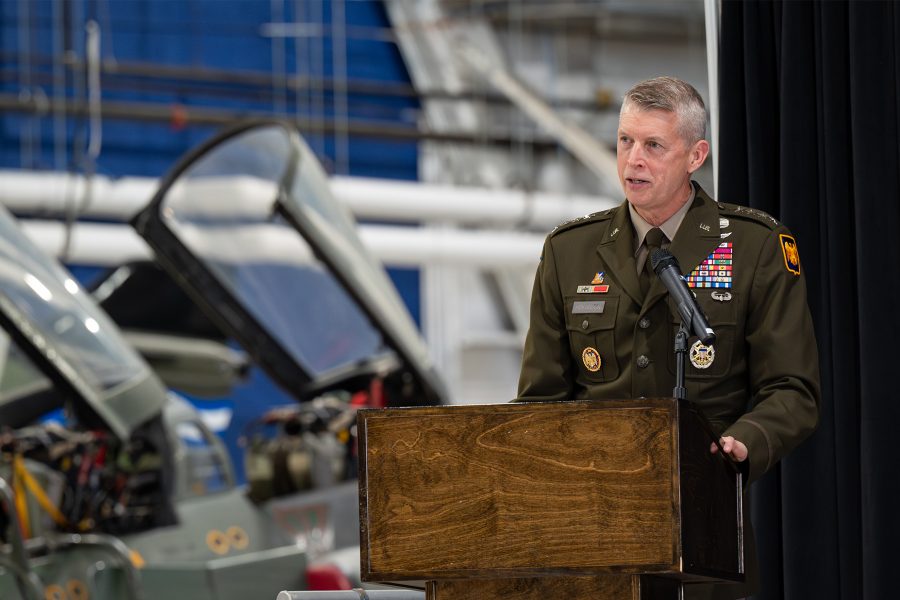After nearly 40 years of service, the last four of which were spent as Chief of the National Guard Bureau, Army Gen. Daniel R. Hokanson will retire and relinquish command in a ceremony at Joint Base Myer-Henderson Hall, Va. on Aug. 2 with one key objective unfulfilled: free healthcare for all Guardsmen.
Guardsmen are not eligible for free healthcare under the military’s TRICARE program unless they are on Active status or just returning from it, but the Guard’s breathless, years-long support of COVID-19 relief efforts crystallized Hokanson’s position that Guardsmen should have the same full-time, free government health insurance provided to their Active counterparts.
“We had 43,000 Guardsmen across the country at one point supporting COVID, and what we found is we wanted to reassure their families that they would have healthcare no matter what we asked them to do,” Hokanson told Air & Space Forces Magazine in an interview earlier this year.
Going back and forth between Active orders throws off civilian healthcare plans and destabilizes coverage, which is a stressful situation for service members and their families, Hokanson explained. He wanted to bring peace of mind where “if they get hurt or injured while serving their nation, whether they’re responding to a disaster or deployed overseas, we’re going to provide the healthcare to get them ready again.”
Guardsmen can pay for TRICARE Reserve Select (TRS), a premium-based version of TRICARE military coverage, or receive civilian healthcare. But because coverage comes at a cost, many Guardsmen members go without healthcare. Guardsmen and Reservists on federal Active-duty orders for more than 30 consecutive days receive identical healthcare benefits as Active-duty servicemembers. But Roughly 60,000 Guardsmen do not have their own health insurance, according to figures from the National Guard Bureau. The National Guard Association of the United States, a non-profit, says roughly 130,000 Reserve and Guard component personnel have no “consistent” health insurance.
“When you look at a Guardsman, they’ve invested a lot of their life,” Hokanson said. “On the other hand, you look at the government, we made a huge investment in them paying for them to get through basic training, we paid for them to get through their advanced training, and we’re paying them every drill weekend. We need them to step on the field and play their position every time.”
A bipartisan group of legislators has cosponsored the Healthcare for Our Troops Act, a bill that would provide zero-cost TRICARE coverage for Guardsmen and Reservists, multiple times over the past several years, but the bill has not made it into law. Legislation introduced this year by Rep. Joe Neguse (D-Colo.) seeks to “ensure that members of the National Guard and Reserve have the healthcare needed to maintain force readiness by allowing them to access care through the Department of Veterans Affairs when not on Active orders.”
Hokanson made a similar argument by framing healthcare as a readiness issue. Guardsmen and Reservists deemed non-medically ready were more likely to be uninsured, the Institute for Defense Analysis Found in a 2021 report, which did not endorse a so-called “TRICARE for All” option. But covered preventative care and mental healthcare help keep troops in the “ready” category, the general said.
“It’s not just that it’s a retention tool,” Hokanson said, though free healthcare for Guardsmen could also benefit retention and make employers more inclined to hire troops in lean recruiting years.
“When I talk to business executives, many of them are surprised that we don’t have it already,” Hokanson said.
Businesses receive some tax breaks for employing Guardsmen, but Hokanson recalled many executives saying the tax process can be “confusing” from state to state, while free healthcare, which employers would not have to pay for, is a more tangible monetary benefit that helps their bottom line.
“They said that is probably one of the best things that we could do to encourage businesses to hire Guardsmen,” he said.
Hokanson will likely be replaced by Air Force Lt. Gen. Steven S. Nordhaus, who is awaiting confirmation by the Senate. The Chief of the National Guard Bureau is a member of the Joint Chiefs of Staff.
“Hopefully one day we’ll get it across the line,” Hokanson said.


